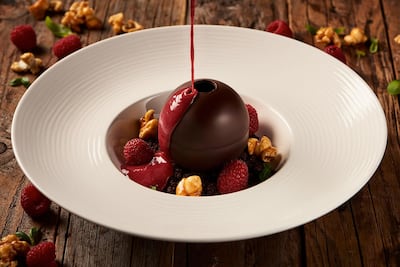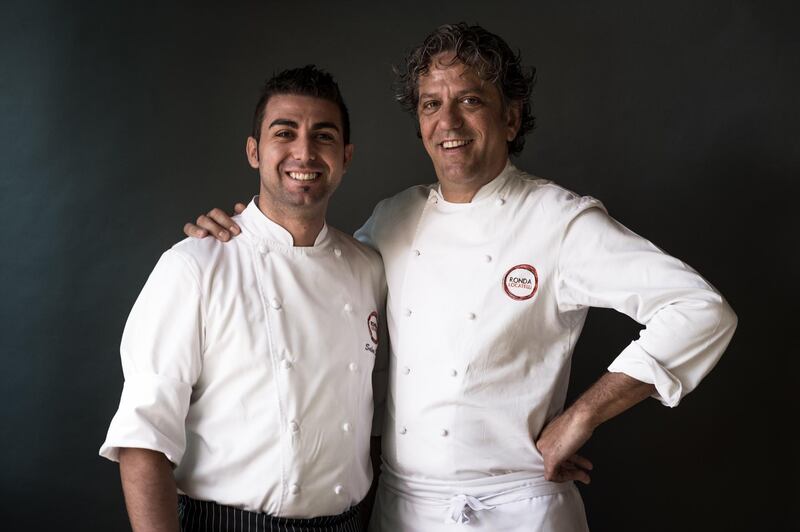Michelin-starred chef Giorgio Locatelli and chef de cuisine Salvo Sardo have recently introduced a new vegan menu at Ronda Locatelli at Atlantis, The Palm. Locatelli began developing the menu at his London restaurant in an “organic way”, in response to his daughter’s diet – she had converted to veganism at university.
“It was a bit of a challenge, but we’d noticed that Italian cuisine lends itself to vegan food very well, especially as much of it is based on traditional peasant food,” says the chef. As well as capturing the current zeitgeist for plant-based dishes, then, the menu simultaneously offers a retrospective of traditional Italian staples from a simpler time, when fewer resources were available.
'We cannot carry on eating the way we are eating'
The Second World War resulted in a scarcity of meat for many Italians, and recipes were developed and adapted to stretch the limited supplies, resulting in dishes such as lasagne and other flavoursome staples that were free of meat, egg and dairy. There’s a very particular accent to each of the regions, based on readily available produce. For instance, chicory abounds in Puglia, while in the north there’s cabbage, so these vegetables were utilised in the dishes.
“If you look at it, there are so many common natural ingredients [in vegan and Italian cuisines]. Pasta is easy to make without eggs. Even in London, we always had at least one eggless pasta, partly because my daughter was allergic to eggs,” says Locatelli. “Sardinia does pasta without eggs, and in the northeast of Italy, pasta is made with potatoes mixed with flour and no eggs for gnocchi. This is something in our tradition; I haven’t invented it. What’s quite important is that you can have a delicious meal without having meat and fish,” he explains.
Locatelli and his team had to search for a decent vegan mozzarella for the pizza, and in the end, they employed a little alchemy to develop their own. It's made using coconut milk and soya, although neither of these ingredients is detectable in the taste of the final product, which has the flavour of aged cheese and is delicious served piping hot on a fresh margherita. For a habituated consumer of traditional mozzarella, the vegan cheese may be a little different, but it ticks the boxes for pizza-making. "It smells right, its melting point is good, it has the same colour, browning and filamented texture. We were very excited when this arrived on the scene and we worked together to make it locally," says Locatelli.
Other items on the new menu include: tomato focaccia; baby spinach salad with walnuts and a pomegranate dressing; spaghetti alla puttanesca with tomato sauce, black olives, cherry tomatoes and capers; chilli and garlic broccoli. Desserts take in the sfera di cioccolato, a chocolate sphere with coconut ice cream, mixed berries and hot raspberry sauce; a rich chocolate cake; avocado chocolate mousse; and strawberry, mandarin, lemon and coconut sorbets.

“It is proved that we cannot carry on eating the way we are eating. Consumption of meat needs to be capped, and chefs are the best instruments to convince people to do that,” reflects Locatelli. “This menu is a little transformation to make the people understand.”
'This globalisation of food is terrible'
Locatelli prefers to emphasise that the restaurant offers a selection of dishes that are animal-free, rather than deploy the term vegan menu. The waiting staff at Ronda Locatelli are trained to offer a full tasting menu based on the new options – which is how the chef himself prefers to eat when he dines out, eschewing reading through menus, and instead letting restaurant staff bring what they believe are their best dishes.
He observes that young people appear to have no problem opting for vegan food. In fact, they feel responsible for mindful consumption of the planet’s resources, and they think about what they put in their mouths and the impact it has. “This globalisation of food is terrible. We should go back,” he adds. The chef’s vegan daughter is currently working with animals in South America, and on a recent trip home, he cooked her “romanesco with sweet and sour sauce, using pomegranate and sauteed with garlic”, eloquently expressing a father’s love for his daughter in the food that provided a catalyst for the UAE’s most extensive fine dining vegan menu.
The Palm Jumeirah is becoming known as a fine-dining destination, and Locatelli says of his top picks for a night out: "Definitely Nobu. I love it and always have dinner there. Also Social by Heinz Beck and Hakkasan, which has recently relocated to Atlantis and is delicious. I also had a fantastic meal at Yannick Alleno's restaurant at the One&Only. I went with my wife, and have very good memories of the food and ambience."
_________________________
Read more:
[ Meatless burgers and 3D-printed meals: a look at the future of food ]
[ Who needs eggs when you have aquafaba, chia and flaxseeds? ]
[ Heather Mills: My kid is vegan and never sick ]
_________________________
Locatelli is keeping good company on the Palm with other chefs whose restaurants have been awarded Michelin stars elsewhere. “For every chef, getting a star is like any athlete winning a medal at the Olympics. It’s a very good day,” he says.
So is the local restaurant scene now ready for the UAE’s own venues to be similarly recognised by Michelin? “Michelin’s work is very deep and based mainly on standards. In the UAE, everything moves really, really fast, faster than fast. Restaurants appear and disappear, which makes the job of Michelin very hard, as they need to be careful – it’s not just the quality, it’s the ability to do it again and again and again,” he explains. “In the Far East, it took nine years before they produced the first Guide. That is seriously looking at the market; they must have lost thousands on that before they were ready.”
In other words, Dubai's dynamism and pace of change could be a barrier for Michelin's investment – if a restaurant is to be listed, the Guide needs to be certain there will be consistency in that offering and that the venue will exist in the long-term.






